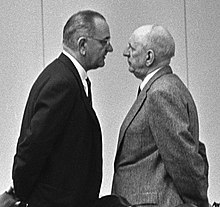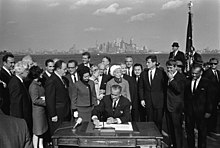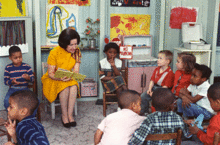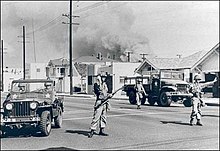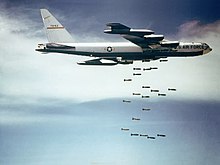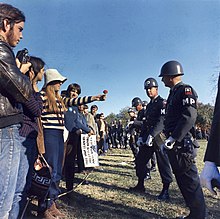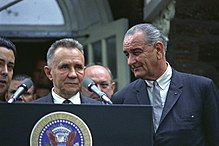Lyndon B. Johnson
For nine months, from 1928 to 1929, Johnson paused his studies to teach Mexican–American children at the segregated Welhausen School in Cotulla, Texas, 90 miles (140 km) south of San Antonio.
[20] When he returned to San Marcos in 1965, after signing the Higher Education Act of 1965, Johnson reminisced: I shall never forget the faces of the boys and the girls in that little Welhausen Mexican School, and I remember even yet the pain of realizing and knowing then that college was closed to practically every one of those children because they were too poor.
[32] Johnson also sponsored projects that gave his Texas district soil conservation, public housing, lower railroad freight rates, and expanded credit for loans to farmers.
[39] While Johnson's loss in the 1941 Senate race was a stinging defeat, he did not have to give up his seat in the House, which permitted him to maintain numerous allies, including George Berham Parr, who ran a political machine in the Lower Rio Grande Valley in South Texas.
[46] Johnson's biographer Robert Caro was quoted as saying "I think that the weight of the evidence at this moment is that the plane was attacked by Zeroes and that he was cool under fire",[46] but also "The fact is, LBJ never got within sight of Japanese forces.
However, Johnson's victory was based on 200 "patently fraudulent"[59]: 608 ballots reported six days after the election from Box 13 in Jim Wells County, in an area dominated by political boss George Parr.
According to Robert Caro: Johnson won an election for both the vice presidency of the United States, on the Kennedy–Johnson ticket, and for a third term as senator (he had Texas law changed to allow him to run for both offices).
He drafted an executive order for Kennedy's signature, granting Johnson "general supervision" over matters of national security, and requiring all government agencies to "cooperate fully with the vice president in the carrying out of these assignments".
"[116] Kennedy made efforts to keep Johnson busy and informed, telling aides, "I can't afford to have my vice president, who knows every reporter in Washington, going around saying we're all screwed up, so we're going to keep him happy.
[133] He and the Secret Service, not knowing whether the assassin acted alone or as part of a broader conspiracy, felt compelled to return rapidly to Washington, D.C.; this was greeted by some with assertions that he was in too much haste to assume power.
After considerable horse-trading, especially with the carriers who won promises from the president for greater freedom in setting rights and more liberal depreciation allowances from the Internal Revenue Service, Johnson obtained an agreement.
The squad's activities included wiretaps of Martin Luther King's room and the Student Nonviolent Coordinating Committee (SNCC) and the Congress of Racial Equality (CORE).
[170] Johnson was very concerned about potential political damage from media coverage of racial tensions exposed by a credentials fight between the MFDP and the segregationist delegation, and he assigned Humphrey to manage the problem.
'[180][181]Johnson and Dirksen established a strong bipartisan alliance in favor of the Voting Rights Act of 1965, precluding the possibility of a Senate filibuster defeating the bill.
[185] At the Howard University commencement address on June 4, 1965, he said that both the government and the nation needed to help achieve these goals: "To shatter forever not only the barriers of law and public practice but the walls which bound the condition of many by the color of his skin.
[215] Although ESEA solidified Johnson's support among K–12 teachers' unions, neither the Higher Education Act nor the new endowments mollified the college professors and students growing increasingly uneasy with the war in Vietnam.
[239] At an August 2, 1967, cabinet meeting, Attorney General Ramsey Clark warned that untrained and undisciplined local police forces and National Guardsmen might trigger a "guerrilla war in the streets", as evidenced by the climate of sniper fire in Newark and Detroit.
[248] There were bright spots; in January 1967, Johnson boasted that wages were the highest in history, unemployment was at a 13-year low, and corporate profits and farm incomes were greater than ever; a 4.5 percent jump in consumer prices was worrisome, as was the rise in interest rates.
[250] In the congressional elections of 1966, the Republicans gained three seats in the Senate and 47 in the House, reinvigorating the conservative coalition, which made it more difficult for Johnson to pass additional Great Society legislation.
Under pressure from pro-war politicians like Barry Goldwater, Johnson feared that if he made the decision to not stand firm in Vietnam he would lose domestic political credibility as well as contribute to a decline in the international reputation of the U.S.[259] On October 11, 1963, President Kennedy had signed NSAM 263 ordering the withdrawal of 1,000 military personnel by the end of the year following recommendations of the McNamara–Taylor mission report.
[265] Johnson decided on a systematic bombing campaign, which became known as Operation Rolling Thunder, in February 1965 after an attack by Viet Cong guerrillas on Pleiku Air Base, killing eight Americans.
[278] By late 1966, multiple sources began to report progress was being made against the North Vietnamese logistics and infrastructure; Johnson was urged to begin peace discussions.
[287] In August, Johnson, with the Joint Chiefs' support, decided to expand the air campaign and exempted only Hanoi, Haiphong and a buffer zone with China from the target list.
[289] With the war arguably in a stalemate and in light of the widespread disapproval of the conflict, Johnson convened a group of veteran government foreign policy experts, informally known as "the Wise Men": Dean Acheson, General Omar Bradley, George Ball, McGeorge Bundy, Arthur Dean, C. Douglas Dillon, Abe Fortas, Averell Harriman, Henry Cabot Lodge, Robert Daniel Murphy, and Maxwell D.
"[297] The Tet Offensive convinced senior leaders of the Johnson administration, including the "Wise Men" and new Defense Secretary Clark Clifford, that further escalation of troop levels would not help bring an end to the war.
[298] Johnson was initially reluctant to follow this advice, but ultimately agreed to allow a partial bombing halt and to signal his willingness to engage in peace talks.
[303] In October 1968, when the parties came close to an agreement on a bombing halt, Republican presidential nominee Richard Nixon intervened with the South Vietnamese, promising better terms so as to delay a settlement on the issue until after the election.
[307] Though actively engaged in containment in Southeast Asia, the Middle East and Latin America, Johnson made it a priority to seek arms control deals with Moscow.
The opportunity arose when an opening occurred for ambassador to the UN, with Adlai Stevenson's death; Associate Justice Arthur Goldberg accepted Johnson's offer to transfer to the UN position.
Historian Kent Germany explains:The man who was elected to the White House by one of the widest margins in U.S. history and pushed through as much legislation as any other American politician now seems to be remembered best by the public for succeeding an assassinated hero, steering the country into a quagmire in Vietnam, cheating on his saintly wife, exposing his stitched-up belly, using profanity, picking up dogs by their ears, swimming naked with advisers in the White House pool, and emptying his bowels while conducting official business.


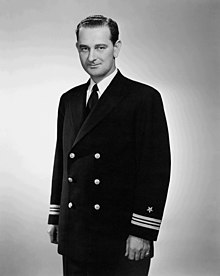

-
Johnson—>90%
-
Johnson—80–90%
-
Johnson—70–80%
-
Johnson—60–70%
-
Johnson—50–60%
-
Stevenson—50–60%
-
Stevenson—60–70%
-
Stevenson—70–80%
-
Stevenson—80–90%
-
Stevenson—>90%
-
No vote

